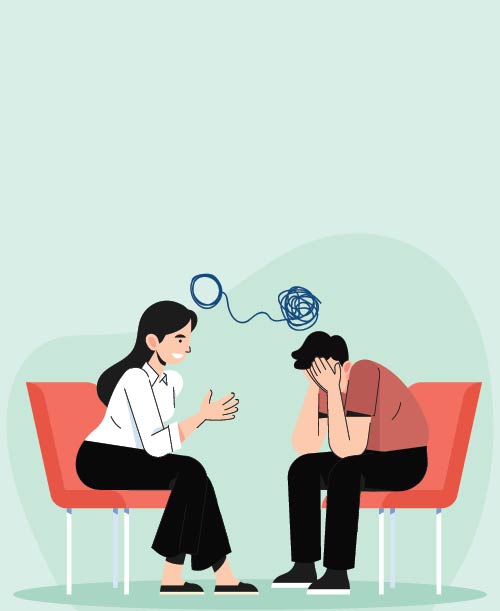Unlocking the Keys of Mental Wellness: A Review of Therapy and Treatment Alternatives
Psychological health and wellness is a facility and critical element of general wellness. Various counseling and treatment choices exist to address different emotional challenges. Each method provides one-of-a-kind benefits and techniques tailored to specific requirements. Comprehending these choices is essential for anybody seeking to enhance their psychological health and wellness. Couples Therapy. What aspects should one take into consideration when checking out these methods? The solution may expose a course to a much healthier mood
Recognizing Mental Health and Its Significance
Mental wellness encompasses the psychological, mental, and social well-being of individuals, considerably influencing exactly how they think, feel, and act. Its importance can not be overemphasized, as it influences every facet of life, including partnerships, job performance, and general lifestyle. Individuals with good mental health and wellness tend to deal with stress extra efficiently, preserve much healthier partnerships, and make educated choices. Alternatively, poor psychological health and wellness can result in emotional distress, impaired functioning, and numerous mental illness, which might require expert treatment. Recognizing mental health and wellness is crucial for recognizing the indicators of distress and the need for support. Understanding additionally promotes empathy and reduces preconception, urging people to seek aid when needed. By focusing on mental health, areas can cultivate atmospheres that support emotional health, eventually causing much healthier, much more resistant individuals. This foundation works as an essential step toward reliable mental health therapy and therapy alternatives.
Sorts Of Therapy Methods
Therapy techniques vary commonly, each tailored to meet the one-of-a-kind demands of people looking for assistance. Among one of the most typical kinds are cognitive-behavioral therapy (CBT), which focuses on recognizing and altering unfavorable idea patterns, and person-centered therapy, which stresses compassion and acceptance. Psychodynamic therapy checks out unconscious procedures and past experiences to recognize existing actions, while solution-focused short treatment intends to determine remedies instead of investigate problems.Additionally, household treatment addresses relational characteristics and communication within households, promoting much healthier interactions. Team counseling supplies a communal room for individuals to share experiences and sustain each other. Other approaches include existential therapy, which motivates people to discover meaning and function, and art or music therapy, which uses creative expression as a healing tool. Each strategy uses distinct methods and ideologies, enabling customers to discover the most appropriate method for their personal growth and healing trips.
Checking Out Various Therapy Modalities
In the domain of mental wellness therapy, various treatment modalities supply distinct approaches to treatment. Cognitive Behavioral Therapy highlights the link in between behaviors and thoughts, while Psychodynamic Treatment discovers unconscious impacts on psychological well-being. In Addition, Mindfulness-Based Methods promote present-moment awareness as a way to boost psychological policy and general mental health and wellness.
Cognitive Behavioral Treatment
Cognitive Behavior Therapy (CBT) stands out as one of the most widely practiced and investigated methods in mental health treatment. This method concentrates on the affiliation between sensations, thoughts, and habits, emphasizing that altering unfavorable thought patterns can lead to improved psychological well-being and behavioral changes. CBT is structured, commonly entailing a minimal number of sessions, and aims to outfit people with practical skills to handle their signs and symptoms. It is efficient for a variety of conditions, including stress and anxiety problems, depression, and trauma. By using techniques such as cognitive restructuring and direct exposure therapy, CBT cultivates resilience and encourages customers to confront obstacles head-on, making it a useful choice in the landscape of mental health and wellness treatments.
Psychodynamic Therapy Techniques
Psychodynamic treatment techniques supply a deep exploration of the unconscious mind and its influence on habits and emotional well-being. Rooted in Freudian theory, these techniques emphasize the importance of early childhood years experiences and subconscious problems. Through techniques such as complimentary association, dream analysis, and transference, people obtain insight into their feelings and thoughts, promoting self-awareness and understanding. This healing modality urges customers to discover quelched feelings and unsettled problems, which can be crucial in resolving existing emotional difficulties. By checking out the interaction between existing behaviors and past experiences, psychodynamic therapy aims to promote psychological recovery and individual development. Ultimately, it supplies a framework for individuals to explore complex inner characteristics that influence their psychological health and wellness.

Mindfulness-Based Strategies
While conventional treatments typically concentrate on past experiences, mindfulness-based strategies focus on present-moment understanding as a pathway to psychological wellness. These techniques, including mindfulness-based cognitive treatment (MBCT) and mindfulness-based stress decrease (MBSR), encourage individuals to engage fully with their ideas and feelings without judgment. Practitioners find out to observe their frame of minds, promoting a better understanding of psychological triggers and actions. This practice not just minimizes signs of anxiousness and depression however also boosts total mental resilience. By integrating mindfulness exercises, such as meditation and deep breathing, customers cultivate a feeling of peace and clearness. Inevitably, mindfulness-based strategies encourage individuals to browse life's challenges with raised recognition and acceptance, promoting a healthier partnership with their feelings and thoughts.
The Duty of a Therapist or Therapist
A proficient therapist or therapist plays a vital role in supporting individuals via their mental health and wellness journeys. They give a safe, non-judgmental area where clients can express their feelings and ideas honestly. Cognitive Behavioural Therapy. By employing numerous restorative strategies customized per person's needs, specialists assist customers discover underlying issues that may contribute to their mental health challenges.Therapists provide support and devices to manage stress and anxiety, anxiety, anxiety, and other emotional troubles. Their training furnishes them to identify patterns in behavior and assumed processes, facilitating insights that result in personal growth. They likewise cultivate a strong healing alliance, which is important for successful outcomes.Moreover, therapists stay dedicated to confidentiality and ethical requirements, making certain a relying on setting. Eventually, the duty of a therapist or counselor is to encourage individuals, motivating them to establish durability and healthier coping approaches while guiding through life's intricacies
How to Choose the Right Therapy or Therapy Choice
Choosing the appropriate counseling or therapy alternative starts with examining private needs. It is essential look at more info to recognize individual challenges and goals prior to checking out various treatment designs. This fundamental action can substantially influence the effectiveness of the selected approach.
Analyze Your Needs

Exactly see here now how can people efficiently assess their mental health and wellness requires when assessing counseling or treatment choices? They ought to reflect on their psychological state and recognize details issues, such as anxiety, depression, or relationship obstacles. Journaling can be a valuable device for tracking thoughts and feelings with time. Furthermore, people may gain from seeking responses from trusted buddies or family participants concerning viewed changes in behavior or state of mind. It is also useful to evaluate individual objectives for therapy, such as boosting coping skills or getting understanding right into personal patterns. Finally, researching numerous counseling methods and their viability for specific demands can help in making an informed option. Eventually, self-awareness plays a crucial duty in picking the appropriate course for psychological wellness assistance.
Check Out Treatment Styles
While traversing the varied landscape of therapy options, individuals need to think about various styles of counseling to locate the very best fit for their special requirements. Cognitive Behavior Modification (CBT) concentrates on changing negative idea patterns, while Psychodynamic Therapy checks out subconscious procedures and past experiences. Humanistic strategies emphasize personal growth and self-actualization, cultivating a helpful setting. Additionally, mindfulness-based treatments cultivate present-moment understanding, helping psychological guideline. For those looking for framework, Solution-Focused Brief Therapy targets particular goals and solutions. Team therapy offers a common setting for shared experiences and assistance. Eventually, individuals should assess their preferences, convenience levels, and particular difficulties, guaranteeing they choose a healing style that resonates with their individual journey towards mental wellness.
Conquering Barriers to Looking For Assistance

The Benefits of Counseling and Therapy for Mental Health
Seeking help for mental health obstacles can cause substantial renovations in total health. Therapy and therapy offer individuals with a secure room to explore their ideas and sensations, fostering self-awareness and individual growth. These professional solutions equip customers with dealing strategies and analytical abilities customized to their distinct situations.Moreover, therapy can minimize signs of anxiety, depression, and various other psychological health and wellness conditions, enhancing emotional resilience. Normal sessions promote responsibility and encourage individuals to establish and achieve personal goals. With numerous therapeutic techniques, such as cognitive-behavioral treatment or mindfulness techniques, clients find out to reframe adverse ideas and create healthier behaviors.Additionally, the restorative relationship itself can be a resource of support, helping to combat seclusion and solitude. On the whole, participating in therapy and therapy is a positive step toward accomplishing psychological wellness, allowing people to lead more satisfying lives.
Often Asked Concerns
The Length Of Time Does Therapy or Treatment Commonly Last?
The duration of counseling or therapy differs considerably, often lasting from a few sessions to several months or years. Factors influencing this consist of the individual's particular demands, the kind of treatment, and healing goals.
What Should I Anticipate During My Initial Session?
During the first session, people can anticipate an intro, discussion of problems, and the therapist's strategy. They may complete evaluations and establish goals, fostering a risk-free setting for open interaction and structure relationship.

Exist Any Dangers Connected With Treatment?
Therapy can involve risks, such as emotional discomfort, susceptability, or confronting excruciating memories. While these challenges might emerge, they can also lead to individual development and healing, making the healing process complicated yet potentially fulfilling.
How Can I Tell if My Therapist Is a Great Fit?
Determining if a specialist is a great fit entails assessing convenience, communication design, and healing method. Favorable rapport and development towards goals are signs of an ideal match, necessary for effective psychological health and wellness support.
Will My Insurance Policy Cover Counseling or Treatment Procedure?
Determining insurance policy coverage for counseling or treatment sessions frequently calls for contacting the insurance provider straight. Policies differ substantially, so individuals ought to verify advantages, co-pays, and any needed pre-approvals before pursuing treatment solutions. Among the most common kinds are cognitive-behavioral therapy (CBT), which focuses on determining and changing unfavorable idea patterns, and person-centered treatment, which highlights empathy and approval. Psychodynamic treatment explores past experiences and subconscious procedures to recognize current actions, while solution-focused short therapy aims to determine options rather than explore problems.Additionally, household treatment addresses relational characteristics and interaction within family members, cultivating healthier communications. Other strategies include existential treatment, which encourages individuals to find meaning and objective, and art or music therapy, which makes use of innovative expression as a therapeutic tool. Cognitive Behavior Therapy emphasizes the link in between habits and ideas, while Psychodynamic Treatment discovers subconscious influences on psychological health. Cognitive Behavioral Therapy (CBT) concentrates on transforming adverse thought patterns, while Psychodynamic Therapy discovers unconscious procedures and previous experiences.